After the trigger and, of course, your own skill, your barrel is going to be probably the biggest deciding factor for your AR-15’s performance.
Few other things even come close.
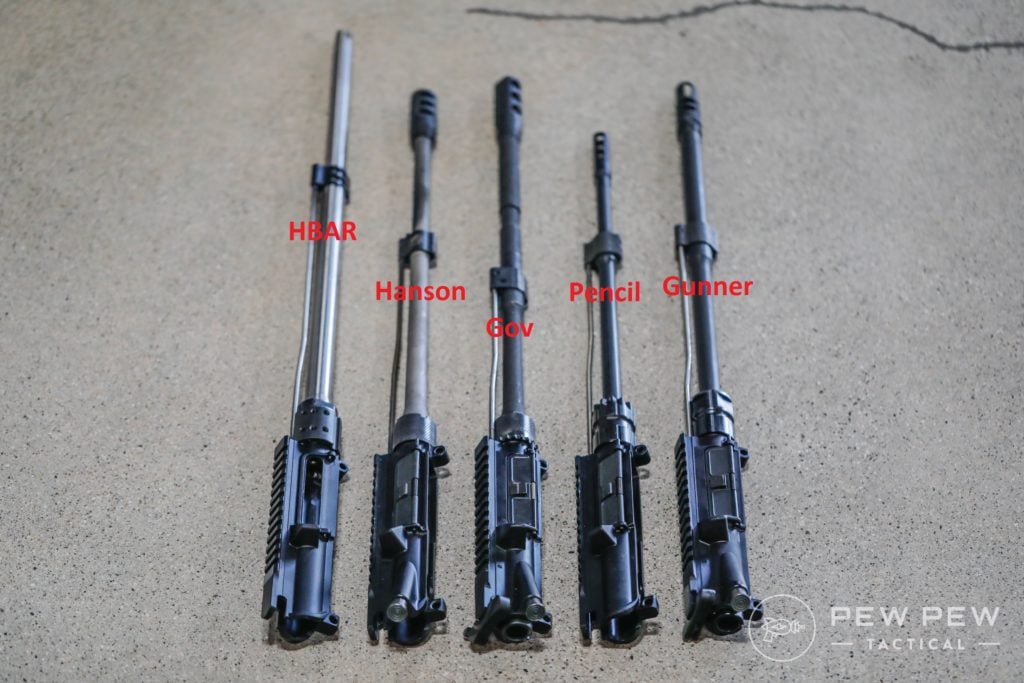
Now, unlike triggers, which are easy to spot differences in and easy to swap, barrels are a bit more complicated.
Today we are going to cover the topic of carbon fiber barrels and some of their advantages over standard steel barrels. And as always, we are going to toss in a couple of our favorite manufacturers and models.
THE QUICK LIST
-
Most Customization
-
Best High-End Barrel
-
Best for Full Auto
Table of Contents
Loading…
Barrel Basics
In general, your standard AR-15 barrel is probably good for 10,000-30,000ish rounds, depending on the material it is made of.
You can also stretch the life of a barrel considerably by not letting it get hot. That means letting the barrel cool off or picking up a heavier barrel.
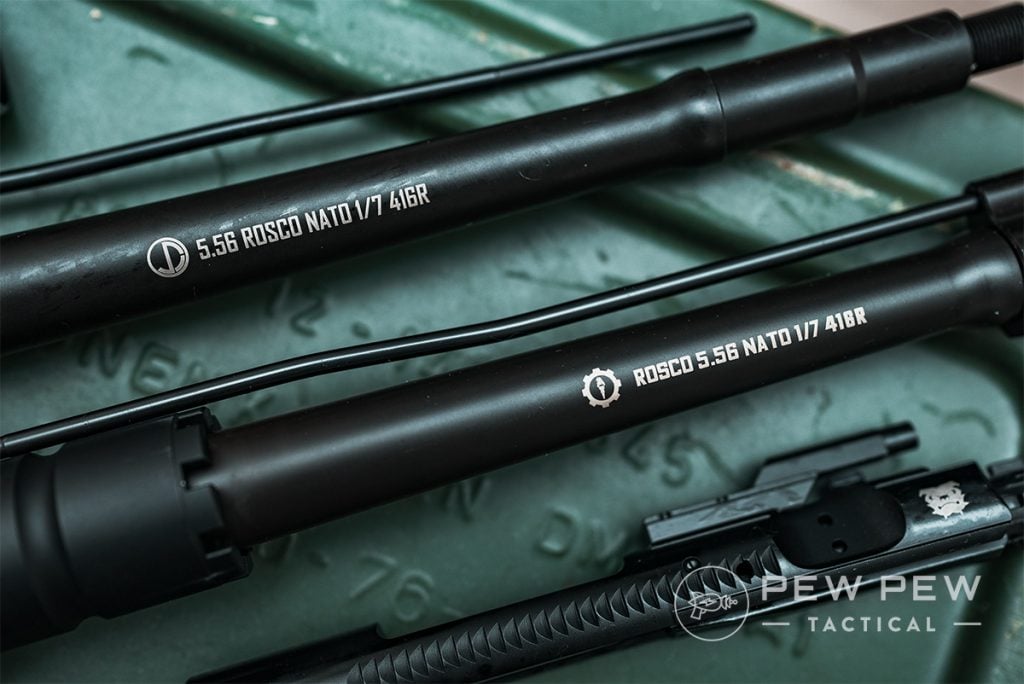
More barrel mass makes it far less temperature-sensitive. The other advantage of a bull barrel is that a thicker barrel is also stiffer and thus less likely to suffer from little harmonic quirks that can cause the rifle to perform inconsistently, depending on what ammo you’re using.
If you want to really dig into the physics of what’s happening to your barrel, RSI has a great article on it if you’re into that sort of thing.
Personally, my head starts to hurt after a while, and I’m reminded why I changed my degree from mechanical engineering, but it’s still interesting to see some of the science behind the guns we use.
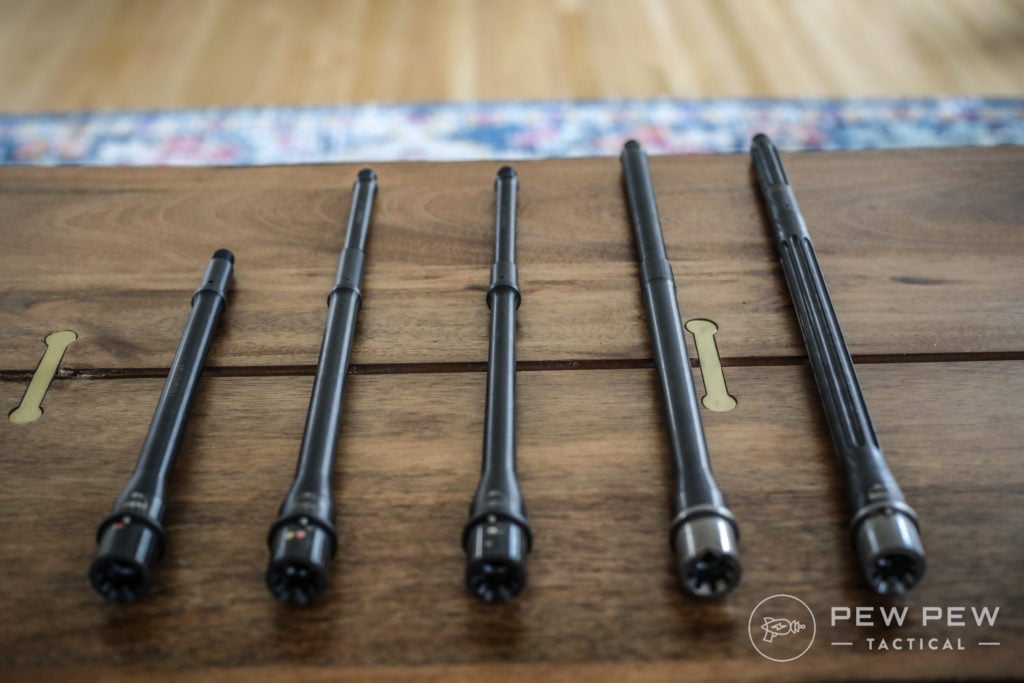
Now, it’s worth noting that most of these considerations likely won’t bother the average shooter. If the gun goes bang and is accurate enough at 100 yards, that’s probably enough.
What is a Carbon Fiber Barrel?
I worked at a gun shop with an attached range where I got to put a silly amount of rounds downrange — well over 20,000 rounds a year. So, naturally, I got to be really picky about my barrels.
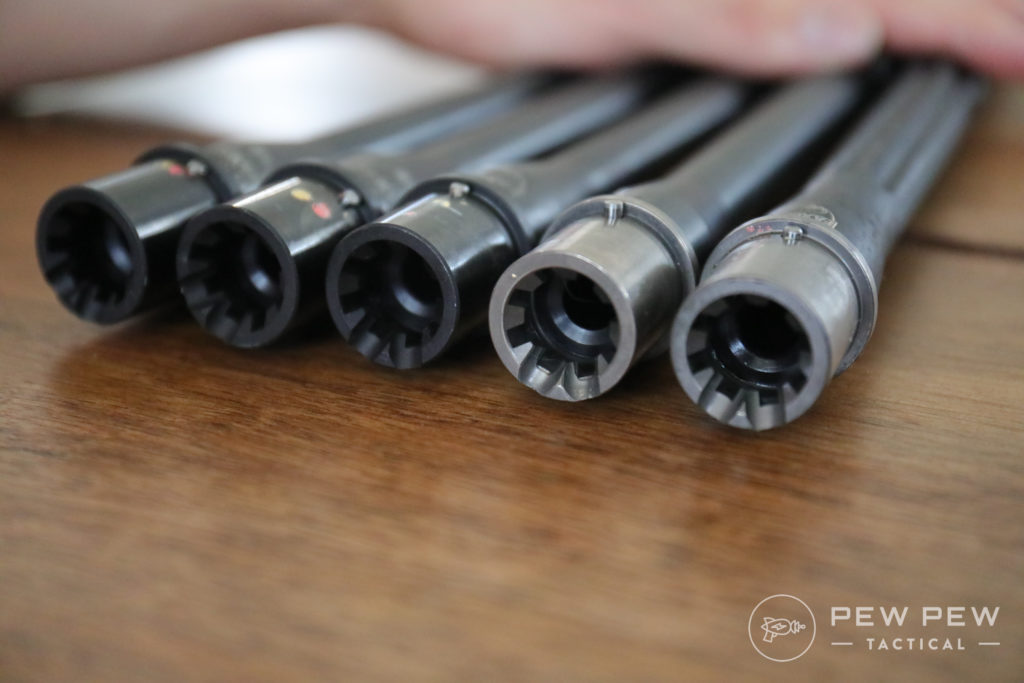
I’m also kind of a metallurgical/machining nerd, and I’ve worked in shops that make barrels and cold hammer-forged parts.
So when I heard about a barrel that gives you the profile of a government barrel, the heat-dispersion and stiffness of a bull barrel, and half the weight of a similarly-profiled barrel, I called bullshit immediately.
Enter the carbon fiber barrel to totally and completely prove me wrong.
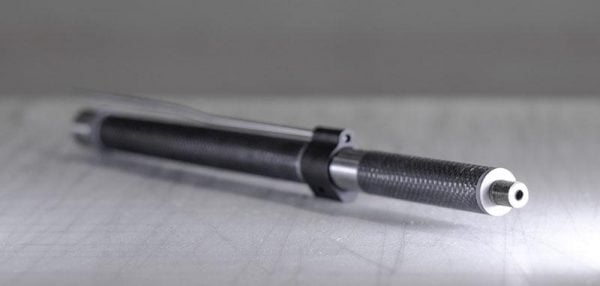
What’s so special about carbon fiber barrels? Are they really worth the hype and the price tag?
In short, abso-freaking-lutely. Long version…well, you’ll just have to keep reading.
Carbon fiber is a polymer-impregnated composite that’s primarily composed of tiny carbon-based filaments (or fibers) 5-10 micrometers in diameter.
On their own, carbon fibers have a very high strength-to-weight ratio, are incredibly stiff, resistant to most chemicals, and are very resistant to temperature changes and thermal expansion and contraction.
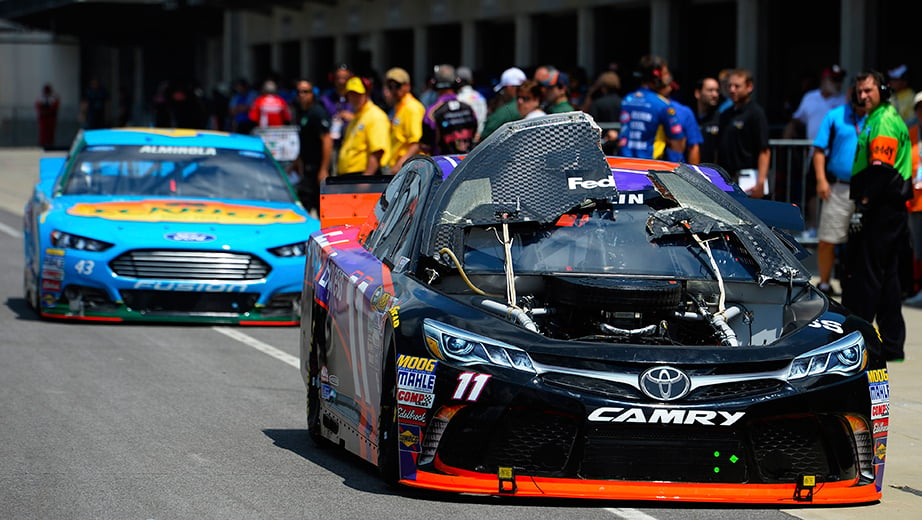
When they are layered with certain polymers, other carbon composites, or ceramics and then baked to a high hardness, they become a super-material that has extensive applications in aerospace, military, engineering, public works, and the wing on your annoying neighbor’s Subaru.
How Do Carbon Fiber Barrels Work?
Carbon fiber barrels are made with (usually) a stainless core that’s noticeably thinner than other barrels. The core includes the rifling that imparts spin to your bullet.
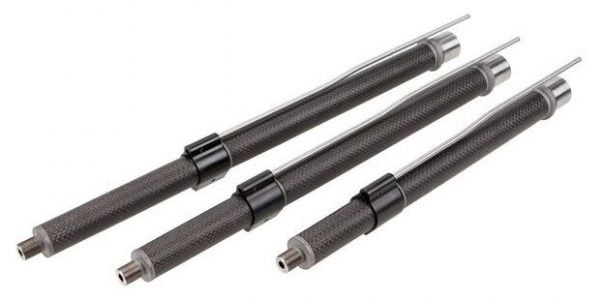
It also includes the threads that mate your barrel to the receiver and the threads for attaching a muzzle device; there are still some things steel is better for.
This metal core is then wrapped in a carbon fiber composite that lends the barrel all its cool properties.

According to PROOF Research, one of the premier makers of carbon fiber barrels, this gives their barrels the following benefits:
- Up to 64% lighter than traditional steel barrels of similar contour
- Match-grade accuracy
- Improved heat dissipation for cooler and longer-lasting barrels
- No point-of-impact shift during high-volume fire
- Reduced harmonic barrel vibration
- Unprecedented durability
What’s the downside of a carbon fiber barrel? Price…
Like I said before, these barrels cost just about as much as a quality rifle on their own. These barrels go above and beyond what the average shooter is really going to need. But again, who ever set out to just be average?

Of course, with these barrels representing such a significant investment of your hard-earned dollars, it makes sense to get the best of the best, so let’s check out a few!
Best Carbon Fiber Barrels
1. PROOF Research
PROOF Research is a Montana-based company that is committed to using cutting-edge materials science to advance the firearms industry.
They also make precision composites for the aerospace industry in their Dayton, OH facility, including parts for the F-35 and B2 Stealth Bomber.
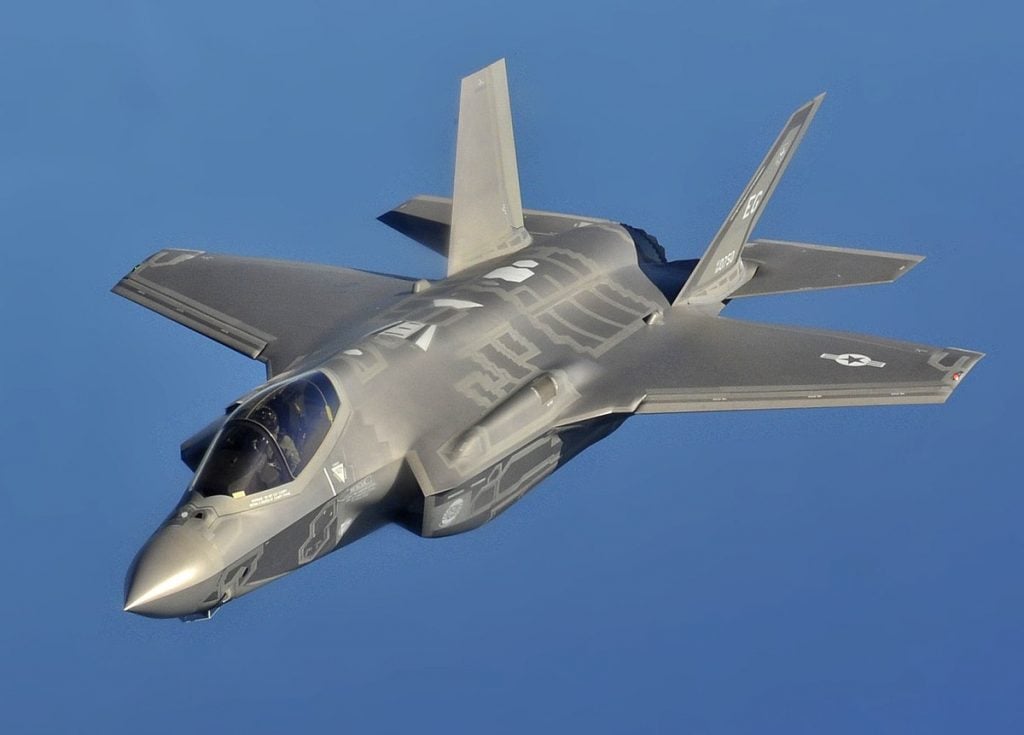
This just goes to show not only how amazing of a material carbon fiber composites are, but it also shows off some of PR’s manufacturing chops.
Even ignoring their awesome, space-age rifle barrels, they still make some of the most accurate steel barrels in the industry.
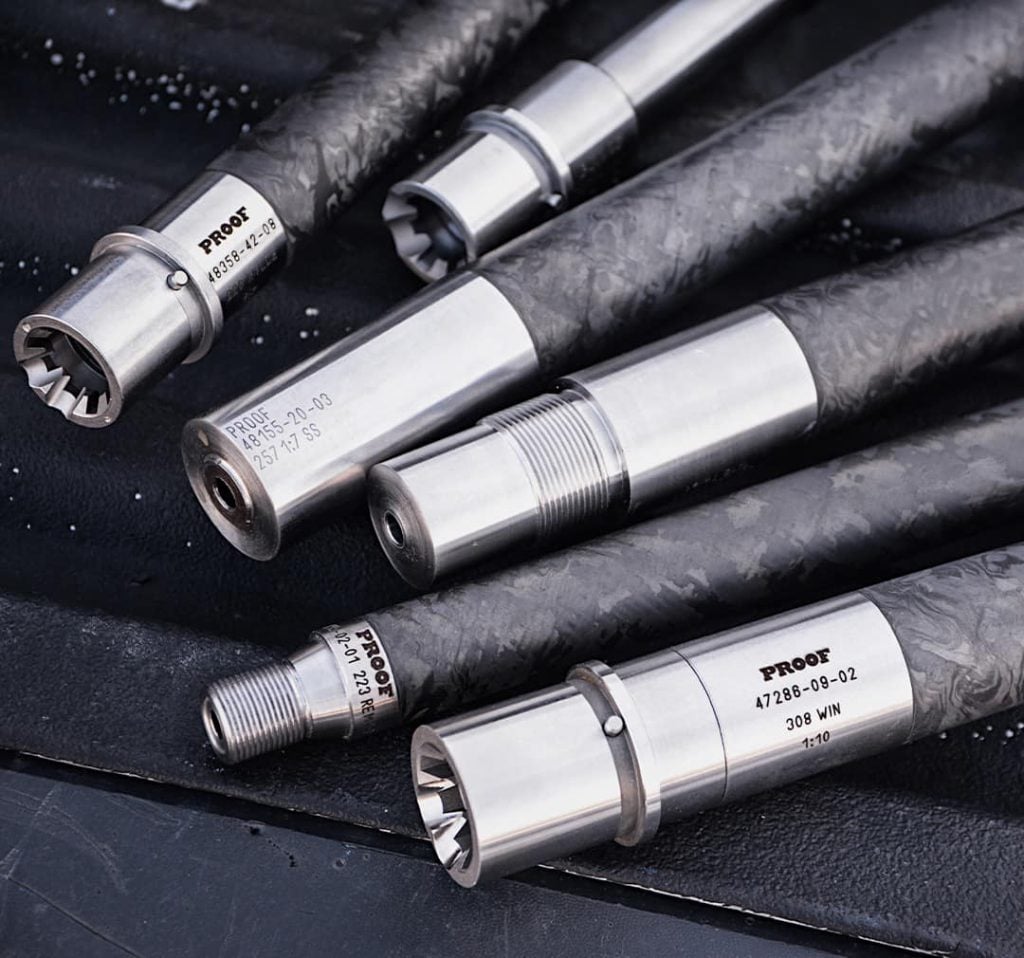
I have had the privilege of wielding rifles sporting PR barrels, and I was thoroughly enamored with them. Specifically, their .223 Wylde barrels and their Ruger Precision Rifle barrel.
PR carbon fiber barrels eliminate a lot of weight, give you superior head dispersal, and are, in general, very accurate. Many consider PROOF to be the leader in the carbon fiber barrel industry.
Prices accurate at time of writing
Prices accurate at time of writing
-
25% off all OAKLEY products - OAKLEY25
Copied! Visit Merchant
What’s your take on PROOF Reseach barrels? Rate them below.
2. Carbon Six
With a Carbon Six barrel, customization is the name of the game. Your barrel is custom-made just for you, which means you get to pick:
- Caliber
- Chambering
- Twist Rate
- Length
- Contour
- Threading
- Gas system length
- Journal diameter
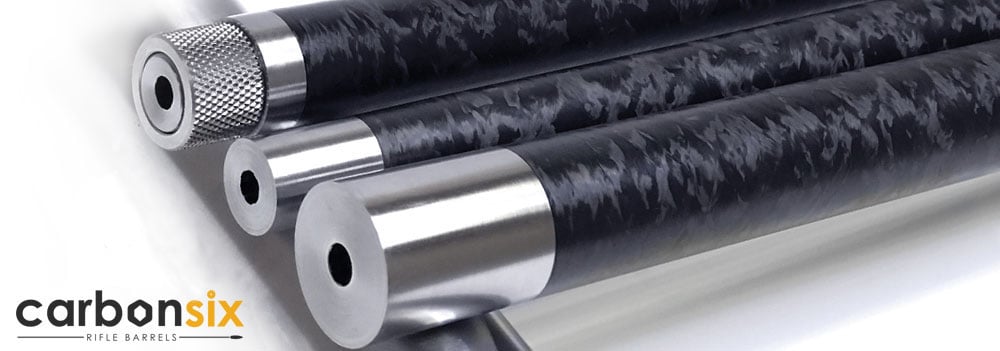
Because of all these amazing options, Carbon Six makes the list on customization alone. If you’re gonna spend the cost of a new gun on just a barrel, you might as well get something you really like.
But they also cite 0.5 MOA performance on top of the benefits of carbon fiber barrels we’ve already talked about. What’s not to love about that?
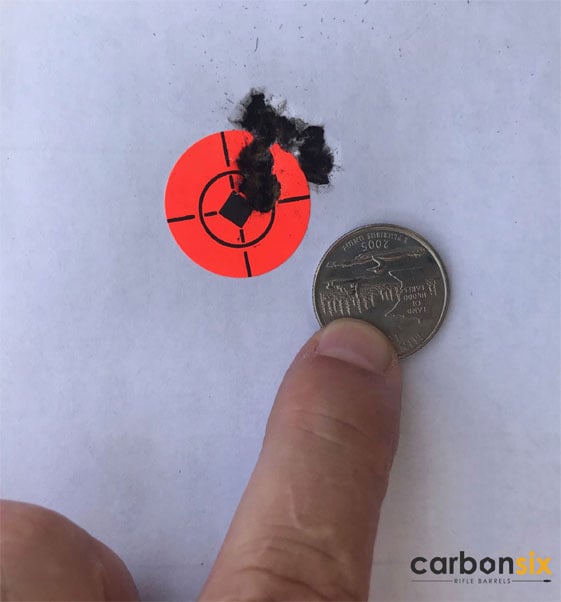
Carbon fiber is also a great barrel material for a hunting rifle, especially if you’re trekking over rough terrain. Every ounce of weight savings is a godsend in that situation.
That said, I don’t hunt enough to build a rifle around a barrel that expensive. But would I spend that much money to have a well-performing and good-looking gun at the range? Absolutely.
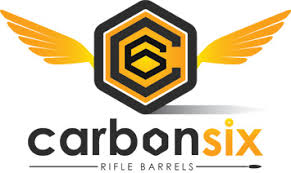
Of all the carbon fiber barrel makers on this list, Carbon Six would definitely be in the running if I had to pay for one with my own money.
Prices accurate at time of writing
Prices accurate at time of writing
-
25% off all OAKLEY products - OAKLEY25
Copied! Visit Merchant
3. Christensen Arms
Christensen Arms makes a variety of products, including bolt-action rifles, modern-sporting rifles, accessories, and of course, some really nice carbon fiber barrels.
I personally can attest to the awesome machining the folks at Christensen Arms put into their products.
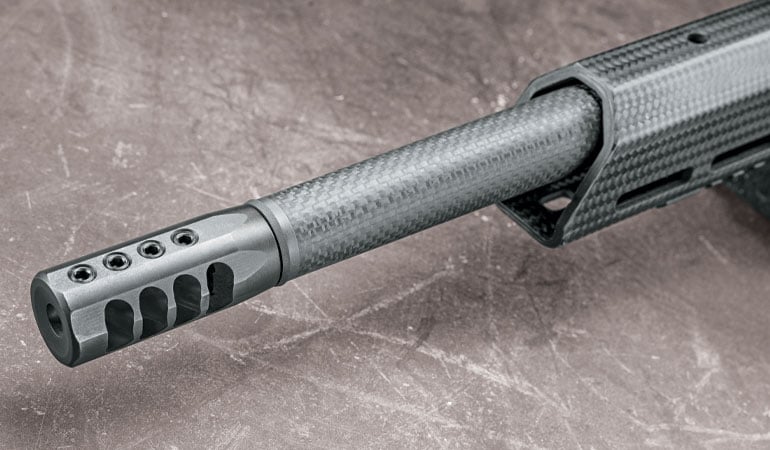
I have used their stuff for a couple of years now, and I have nothing but nice things to say.
Christensen Arms makes the list because they’ve managed to get quality carbon fiber AR barrels out at a price point that almost makes my wallet not cry…almost.

Christensen Arms has great bolt-action barrels and other products, but their carbon-wrapped AR barrels are sometimes priced a bit below their competitors, and they don’t compromise on quality.
The last Christensen Arms barrel I put a round through was an AR built with their upper, lower, and barrel, and I was getting some respectable 0.75 MOA groups on a…less than stellar trigger.
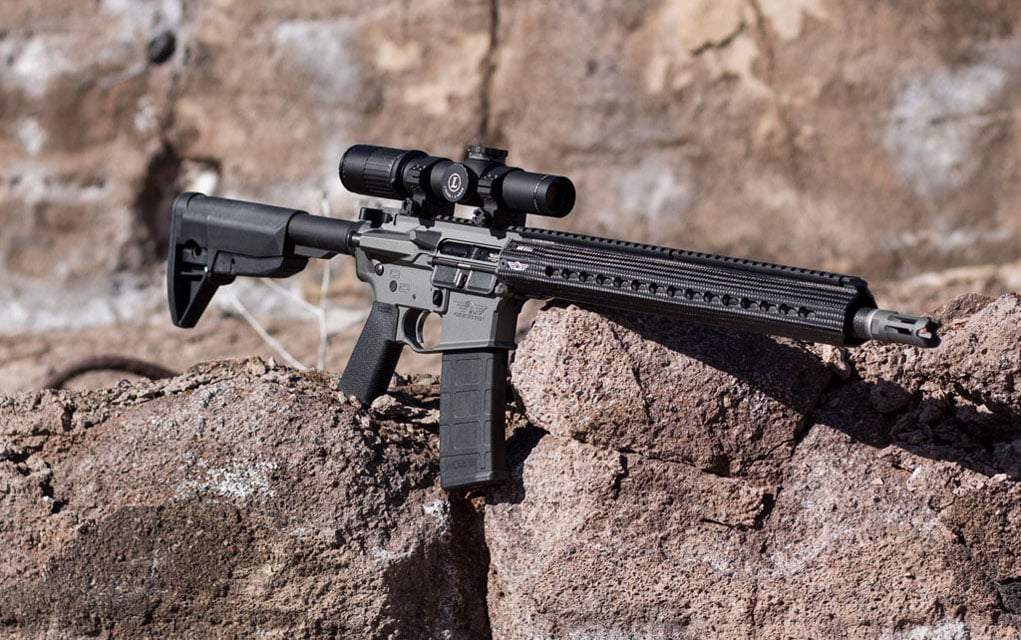
I have no doubt that with a smoother trigger that would let me do my part a little bit better, that rifle would have easily been half-MOA. And no, I don’t know why somebody puts a mil-spec trigger in a rifle with a $550 barrel. Troy, if you’re reading this, what the hell?
Prices accurate at time of writing
Prices accurate at time of writing
-
25% off all OAKLEY products - OAKLEY25
Copied! Visit Merchant
4. BSF Barrels
BSF makes the list because they are doing some truly interesting things with the manufacturing of these types of barrels. Whereas most companies wrap the barrels in carbon fiber composite, BSF uses a proprietary jacketing method that only lets 5% of the carbon fiber actually contact the barrel.
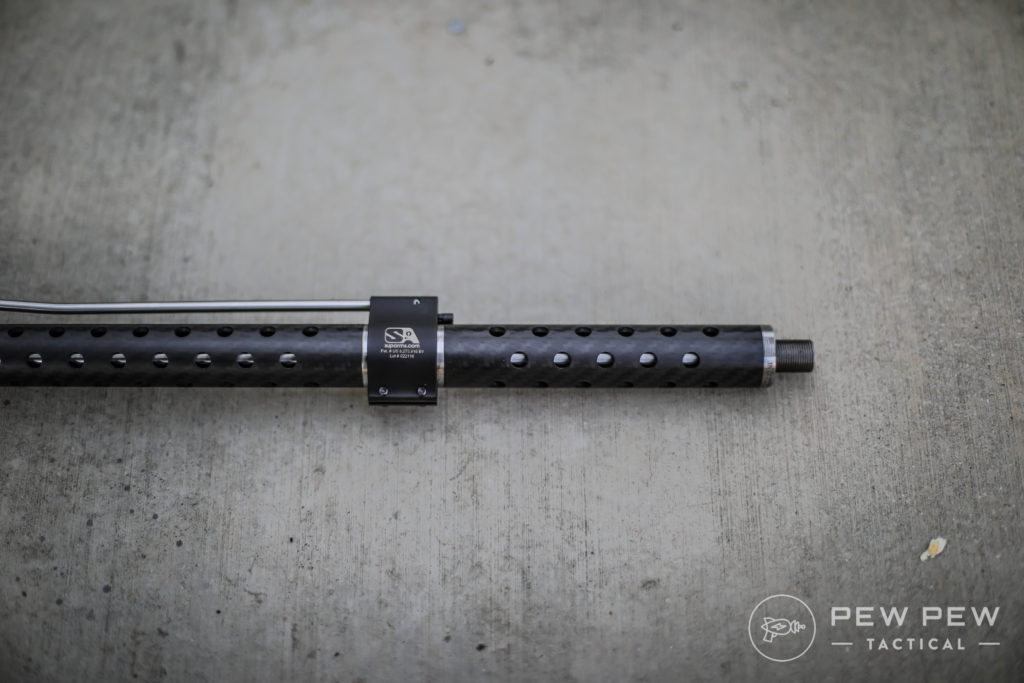
I’ll let BSF explain.
“After turning down the barrel, we jacket a 416R Stainless steel match barrel in a roll-wrapped carbon fiber sleeve and load it under tension. 95% of the carbon fiber does not touch the stainless steel creating air gaps and allowing air to foil around the steel and cool the barrel faster. We use this jacketing method rather than wrapping the barrel in carbon fiber because this method of wrapping has been proven to trap heat and cause delamination. The carbon fiber we use is specially designed to move at the same expansion rate as 416R stainless steel.”
So, to recap, you have a barrel that sheds heat fast, even when compared to other carbon fiber barrels. This means you have a barrel that can stand up to some truly impressive round counts without a break.
If you’re into shooting fast or running full-auto guns, I’d highly recommend BSF barrels as the best way to let loose those mag dumps without stressing your rifling or heating your barrel.
This heat dispersion should give you a barrel that lasts for a very long time, which is a good thing because, like all the other barrels on this list, BSF barrels aren’t exactly cheap.
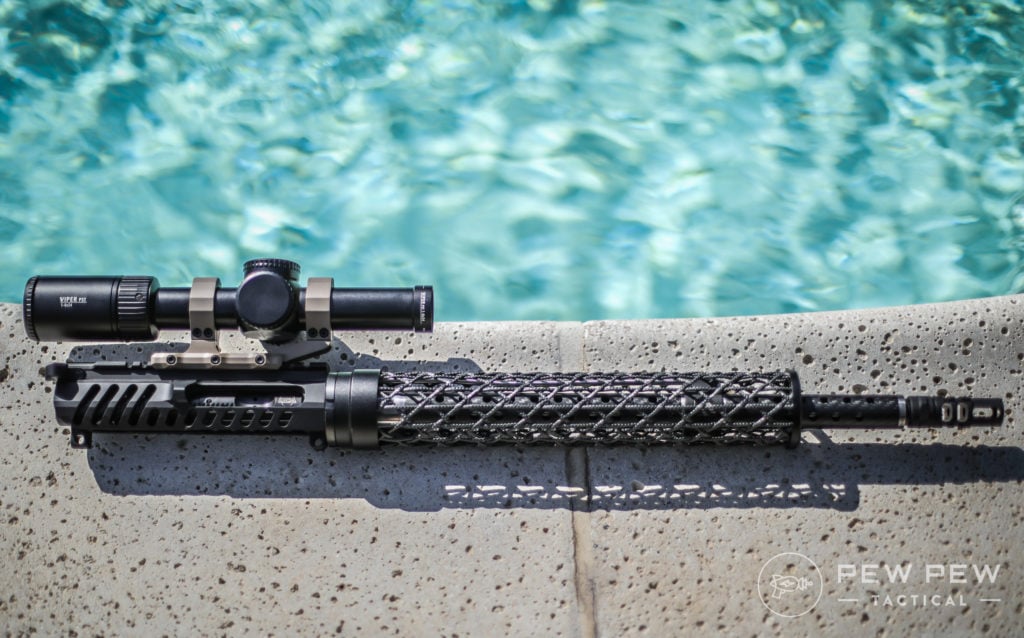
But as with all the manufacturers here, the quality, the materials, and the sheer engineering that go into these things make it worth the cost of admission if you’re looking for the highest-performance barrels around.
Prices accurate at time of writing
Prices accurate at time of writing
-
25% off all OAKLEY products - OAKLEY25
Copied! Visit Merchant
Check out our full review of the carbon fiber BSF Barrel!
Final Thoughts
There we have it, folks.
These are, in my humble opinion, some of the best makers of carbon fiber barrels on the planet, and just possibly, the very best barrels, period.
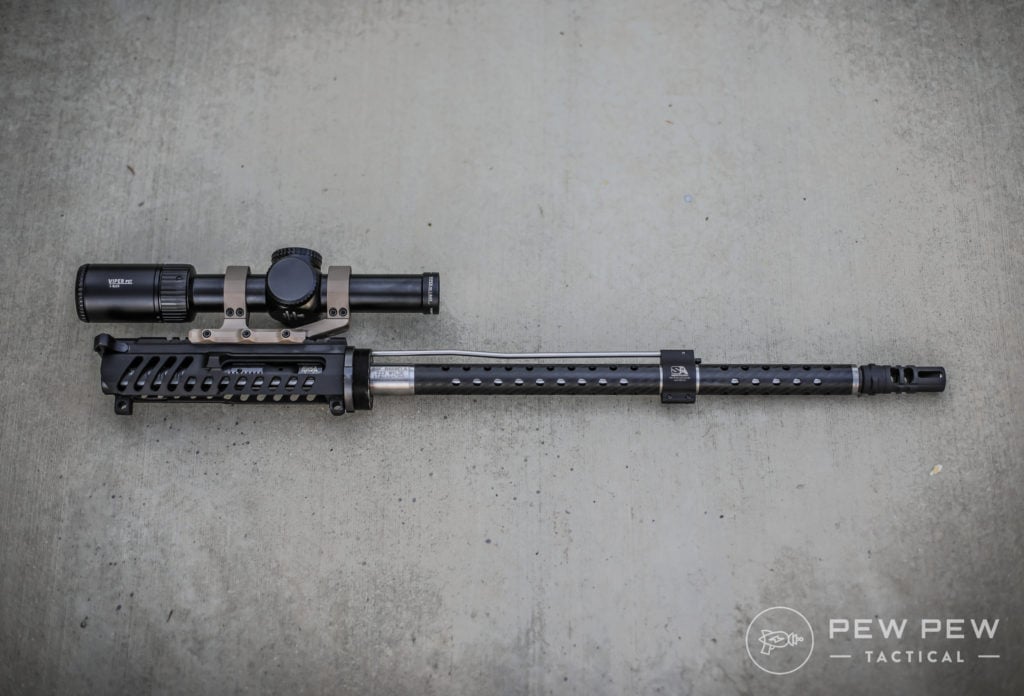
If you’re looking for a barrel that’s light, sheds heat quickly, and is crazy consistent, these are where you should be looking.
What do you think of carbon fiber barrels? Know any other manufacturers out there that you prefer? Let us know in the comments below. Not sold on carbon fiber? Be sure to check out our article on the Best AR-15 Barrels!

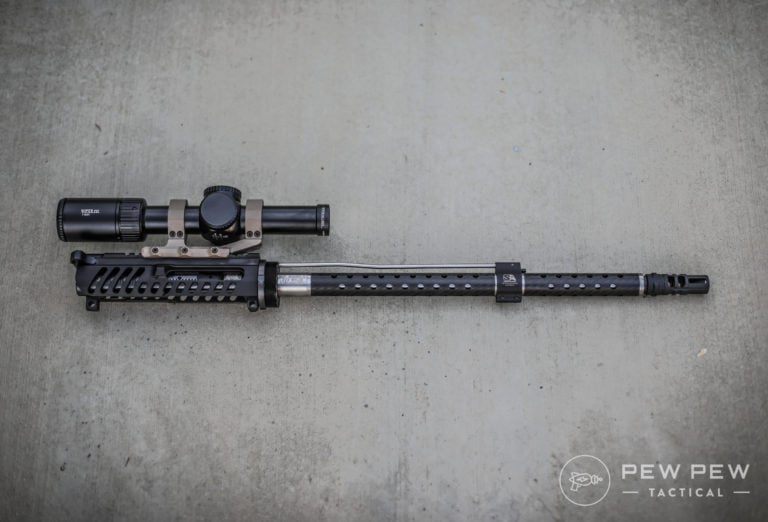





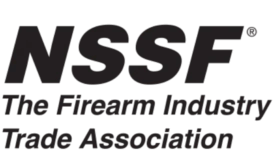








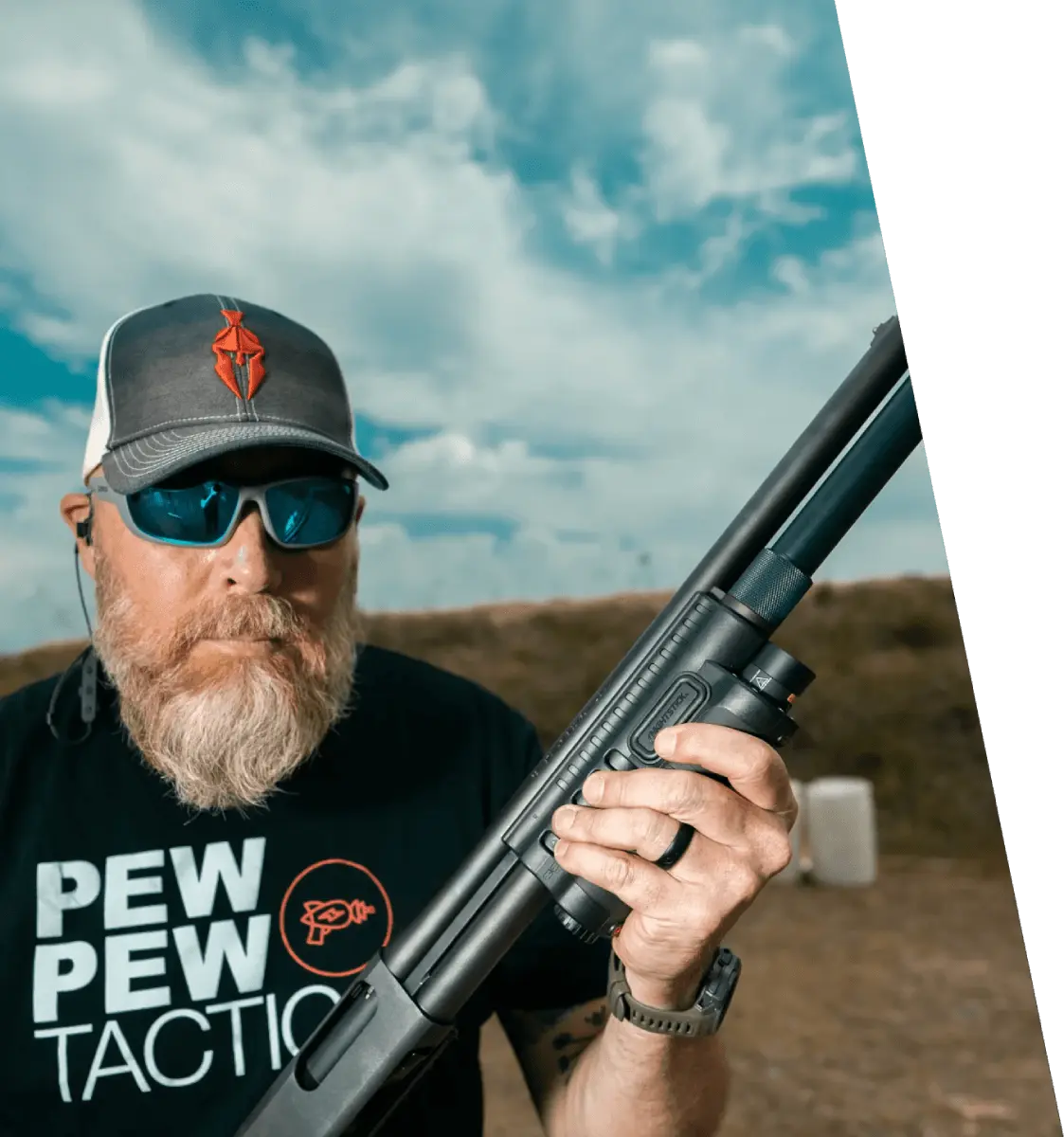

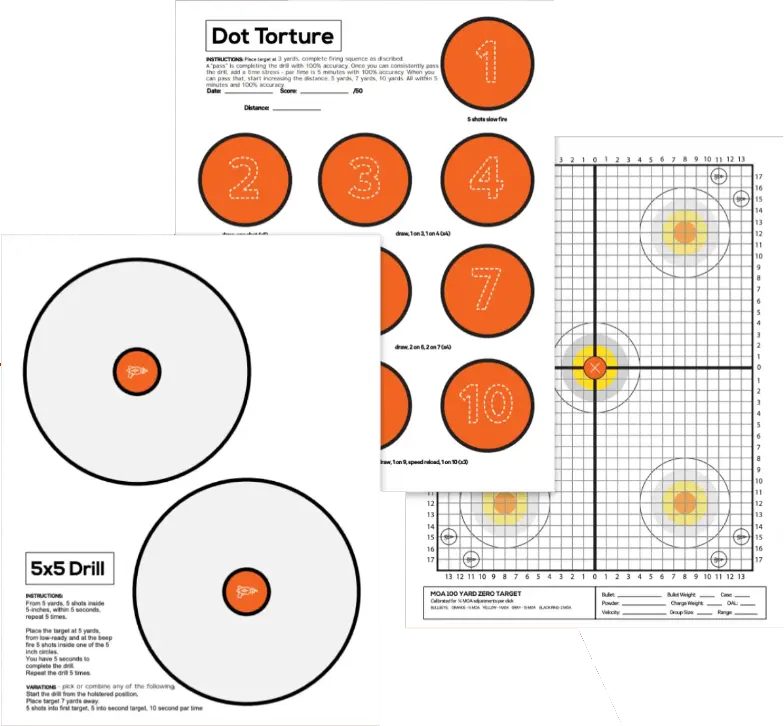
29 Leave a Reply
Some of you points are a fallacy and point to the need for more scientific study. A crude albeit decent way of starting down that path was shown in a YouTube video produced by Allterra Arms entitled: Carbon vs Steel Barrels: Rigidity and Cooling Test. Suggest people take a look. It’s an interesting start.
Thanks for the feedback
Carbon fiber is poor thermal conductor. It is actually classified as a thermal insulator in materials science. I am aerospace technician and have worked with carbon fiber for over 20 years. I know from first hand experience how easy it is to overheat it when drilling into it or performing other machining operations on it. So I really do wonder about the claims for it being cooler. Makes me wonder where the manufacturer are taking the temperature when they claim it dissipates heat better. If you take the temperature on the outside of the barrel of course it’s going to be cooler than a steel barrel., because the heat is trapped inside the carbon fiber which means the barrel is staying hotter inside. Carbon fiber does not dissipate heat, it holds it in.
Barrels are indeed a crucial factor in determining the performance of an AR-15. While triggers are easily noticeable and interchangeable, barrels require a deeper understanding. Carbon fiber barrels have gained popularity due to their advantages over standard steel barrels. They offer increased lifespan, especially when not overheated, and heavier barrels help dissipate heat better. Additionally, bull barrels provide greater stiffness, minimizing inconsistencies in rifle performance. For those interested in the physics behind barrel performance, RSI offers a comprehensive article on the subject. Exploring the science behind our firearms can be fascinating, even if it can become overwhelming at times.
"they become a super-material that has extensive applications in aerospace, military, engineering, public works"
Not so much for submarines.
What gets me about the whole Titan Submersible Saga, is that Carbon Fibre's issues and erratic behavior under extreme compression, are well known in the Materials Engineering field. Rush may have been a good Aeronautic's Engineer, but he sucked at Marine Engineering, ignored the Expert's advice and cut serious corners in his hulls construction. Even using the cheapest CF he could buy (CF past its shelf life for use in Aeronautic applications). Even curing the material wrong. Every expert who looked at his much vaunted Acoustic Monitoring System for Hull integrity, expressed concern that it would not give ample warning for the pilot to begin emergency ascent procedures
There was nothing Innovative about this venture. It was sheer Hubris and a total lack of concern about Safety.
Rush committed Suicide and murdered 4 people because he mistakenly believed he knew better.
Are there any brands manufacturing carbon fiber barrels for handguns?
Correct me if Im wrong, but the only advantage I can see to these CF wrapped barrels is weight savings. There are currently complete AR'S that are capable of 1/2 moa right out of the box equiped with CHF melonite coated barrels & mil spec NB coated triggers.
You kinda made it sound like the only way to get 1/2 moa groups, one had to have a CF barrel & an upgraded trigger. There are reviews of Savage's MSR 15 Recon to where guys are shooting 1/2 moa out of the box, & a few other rifles as well.
I think you missed the point of the heat dispersion and how much life is added to it
Any comment on Fierce Firearms C3 carbon barrels?
What handguard is that on that bag complete upper?
Brigand Arms Carbon Fiber Braid! We have a review of it and other lightweight handguards also!
I'd like to know a couple of things that aren't generally talked about in detail in any of the Carbon-Fiber wrapped barrel write-ups or videos I've seen or read.
Can you tell me exactly what type of resins are used to laminate the CF to the barrels. In one string of comments one of the manufactures states that they use a proprietary resin but none of the others states this. Does this mean that all or most of the other manufactures use readily available CF resins? If so, which resin is it exactly?
My second/last question may come off sounding stupid but I'm basing it on a comment early in your write up. You state that "Usually" 416 stainless barrels are used. Does this mean that sometimes 4140 ChromeMoly is used or some other barrel steel?
Thanks for taking the time to reply.
All these carbon fiber barrels are ".223 Wylde" so that means I cannot use 5.56 ammo, correct?
Hey Joshua, .223 Wylde lets you use BOTH .223 and 5.56 ammo.
Was wondering the same. Thanks Eric.
I have a Falkor Petra 300 win mag with the Dracos straight jacket barrel. This is an AR platform and you can send rounds down range at a rapid pace and still grab ahold of the barrel. No shift in point of impact from first (cold bore) shot to last shot in a 10 round magazine. Check out Falkor defense or Dracos barrel websites for much better explanations than I can give.
I do not work for or have any affiliation with either Falkor Defense or Dracos barrels.
Anybody had experiences with the carbon fiber barrels from Wolfpack Armory
Anyone making 12 Gauge carbon fiber barrels?
Would the CF wrap cause the thinner steel core to heat up more, wear quicker etc. due to insulating the heat within the steel instead of allowing it to dissipate?
No, it would take a lot of math and science to explain in detail but the tl;dr version is that CF is much more conductive of heat than steel, so it actually does a very good job of wicking away and dissipating the heat.
Good catch. This is absolutely true. While carbon fibers may have improved thermal conductivity, the epoxy substrates that make up a fiber reinforced polymer (more general term for carbon fiber composites) are insulators and have very low thermal conductivity. The other problem with heat transfer is that the thermal mass of the CF is very low compared to a full steel barrel, hence the weight savings, but the heat can not dissipate and must be transferred by convection (air flow over the surface). Fiber reinforced composites are not good at that. I do not doubt that these barrels are insanely light and stiff, but heat transfer is not a strength of any polymer.
Any thoughts on these barrels regarding Mirage? I'm looking at a semi auto platform and I'm concerned with not being able to see my target after a string of rounds.
Do these barrels take an adjustable gas block the same way a steel barrel would?
anything about dracos? I am trying to buy a carbon fiber barrel and i have been stuck on dracos but i dont know of anyone shooting them and contacting them to buy one is hell. They have a really good warantee though. who should i go with?
Never used them, sorry. But if contacting them to buy one is problematic - is the warranty something you can count on? If you can't even contact the company to buy them in the first place, how will you contact them if there is a problem?
SO if you were going to start a build with one of these barrels (like the well priced and nice looking BSF wylde 16.5” barrel), how would approach the other components? In other articles, less pricey components (such as Anderson and Aero lowers) were highly reviewed and recommended........but would a high priced high quality barrel dictate use of much higher quality components? Of course, higher price doesn’t necessarily equate to higher quality. Just curious....not sure if there’s such a thing as budget or value AR build that uses an expensive barrel. Seems like using fine china to serve Kraft Mac and Cheese.
Hi Alan, I did a build with the BSF barrel and I went with all high quality components. I'd say definitely go with a good adjustable gas block and a free-float handguard.
hey alan, i have an aero upper and lower with a proof research barrel and all jp guts. its more like serving a james beard award meal and not putting it on fine china. this may offend some but i dont eat plates and my build is amazing